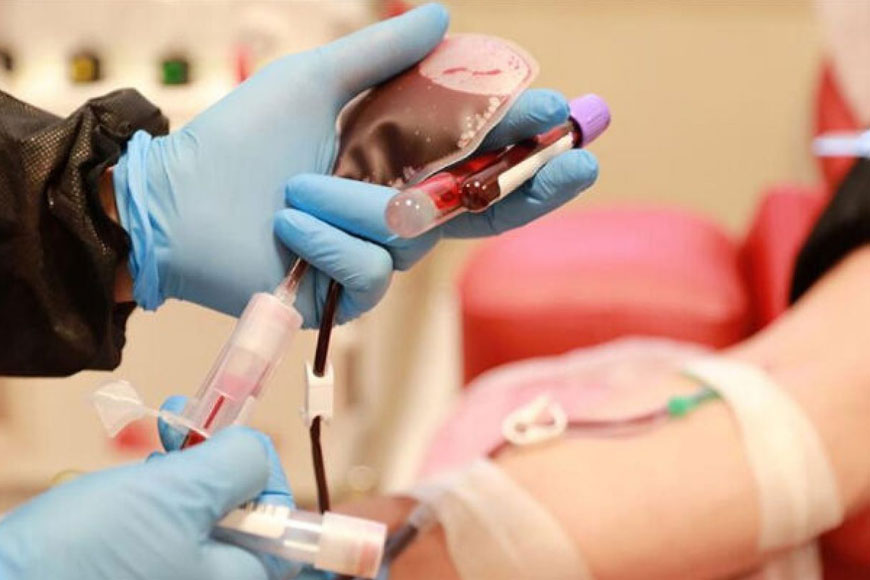Bengal sets a path breaking example in Plasma Therapy research

West Bengal sets a path breaking example in Plasma Therapy research. A majority of researchers are claiming control trial of plasma therapy on Covid-19 patients under the age of 66 is showing encouraging results. When the West Bengal government decided to set up a plasma bank at the Calcutta Medical College and Hospital, designated as an entity for the treatment of coronavirus patients, it was generally welcomed by the medical fraternity primarily because it promised to be a facility to boost COVID-19 therapy trial.
For the past five months researchers of Indian Institute of Chemical Biology (IICB) along with physicians of Calcutta Medical College and Hospital have been conducting randomized control trial (RCT) on plasma therapy in treating 80 Covid-19 patients at Infectious Diseases (ID) Hospital at Beliaghata. The outcome of the trials has shown encouraging results. This report has been submitted to the government recently and has also been published as pre-print preview in the medical archive. It is evident from the report that patients who received plasma therapy along with standard therapy showed a much better recovery rate than those who were given standard therapy. Out of every three Covid-19 critical patients on whom plasma therapy was administered, two survived. The therapy not only boosted their recovery rate but also eased shortness of breath and other symptoms and their dependency on oxygen. The therapy is certainly helping a cluster of patients. The results are certainly promising in Kolkata trials than they are in Delhi.
The Indian Council of Medical Research’s (ICMR) placid study, the world’s biggest randomised control trial on plasma therapy, found that convalescent plasma was not associated with a reduction in progression to severe Covid-19 or all-cause mortality. The trial was conducted on 464 participants from 39 hospitals. It was found that 18 per cent of patients given standard therapy succumbed to the virus and the mortality rate of patients treated with convalescent plasma therapy was19 per cent.
For the past five months researchers of Indian Institute of Chemical Biology (IICB) along with physicians of Calcutta Medical College and Hospital have been conducting randomized control trial (RCT) on plasma therapy in treating 80 Covid-19 patients at Infectious Diseases (ID) Hospital at Beliaghata.
During the trial, plasma was also administered at the moderate stage of the disease — an aspect of the therapy that is still under debate by many doctors. While the ICMR study says plasma therapy does not affect mortality at the moderate stage, there is no clear consensus about whether it would work if given at other stages of the disease. In the trials conducted in Kolkata, the mortality rate of patients ranging from mild to moderate to the critically ill who were administered standard treatment has been 34.78 per cent, but in cases where standard therapy has been supplemented with plasma therapy, the mortality rate has reduced drastically to 11.11 per cent, a sizeable drop indeed.
According to the researchers’ findings in Kolkata, convalescent plasma therapy is most effective in the case of patients under the age of 66. The success of this therapy lies in selecting the right donor and at the right stage of treatment when plasma needs to be infused to a critical patient to get the best result. The trials conducted by the expert team comprising immunologist Dr Dipyaman Gangopadhyay, infectious disease specialist Dr Yogiraj Roy, Tropical Medicine specialist Dr Bibhuti Saha and Transfusion Medicine Specialist Dr Prasun Bhattacharya could well show the path and pave the future for antibody management and plasma therapy protocol.
Also read : COVID-19 Plasma Bank coming up in Kolkata!
While comparing ICMR’s trial with the trial conducted in West Bengal, the chief researcher of the project and IICB’s Translational Research Unit’s associate Professor Dr Dipyaman Gangopadhyay said, ICMR’s trial started much earlier than the one in Kolkata. Besides, after the guidelines on plasma therapy were released, there was no way to standardise its use. In fact, the ICMR trial has faced criticism over testing of neutralising antibodies in the donor plasma post-facto. A large number of patients who were given plasma already had antibodies. In other words, the level of antibodies in the plasma was checked after it had been donated, reportedly due to lack of testing kits at the time. If you already have, giving it from outside may not be of much use. But the research team working in Kolkata had been very particular about testing and finding out the level of antibody formed in the donor’s plasma before giving the nod.
The trials conducted by the expert team comprising immunologist Dr Dipyaman Gangopadhyay, infectious disease specialist Dr Yogiraj Roy, Tropical Medicine specialist Dr Bibhuti Saha and Transfusion Medicine Specialist Dr Prasun Bhattacharya could well show the path and pave the future for antibody management and plasma therapy protocol.
During the trial, if any donor’s plasma level was found to be below 1.5 titer, her/his plasma was rejected. This strict vigilance led to narrowing down the number of donors to 45 from161. The crucial role played by two senior scientists of IICB, Sandeep Paul and Shilpak Chattopadhay, in the project cannot be undermined. The head of Transfusion Medicine department and Plasma Bank of Medical College, Dr Prasun Bhattacharya said, the team tried to collect plasma from Covid-19 patient/donor 28 days after recovery because this is the time when the best strain of novel corona virus antibodies are found in the system which get diluted gradually over time. After 40-45 days, the antibody becomes weak and impotent. The team used the RTPCR method to check if the donor actually tested Covid-19 before collecting plasma.
The ICMR’s trial was conducted at several centres across different states but in West Bengal, all the participating patients were undergoing treatment in one hospital. So, it became easy for the team members to coordinate and work together under one roof. This is another reason for the efficacy of the Kolkata trial. Also, majority of patients on whom ICMR researchers tried the plasma therapy, had mild to moderate symptoms of Covid-19. Hence, the potency of the therapy could not be ascertained but in Kolkata, the therapy was used as a supplement on patients with severe symptoms of Covid-19. This positively confirmed the effectiveness of plasma therapy here.











